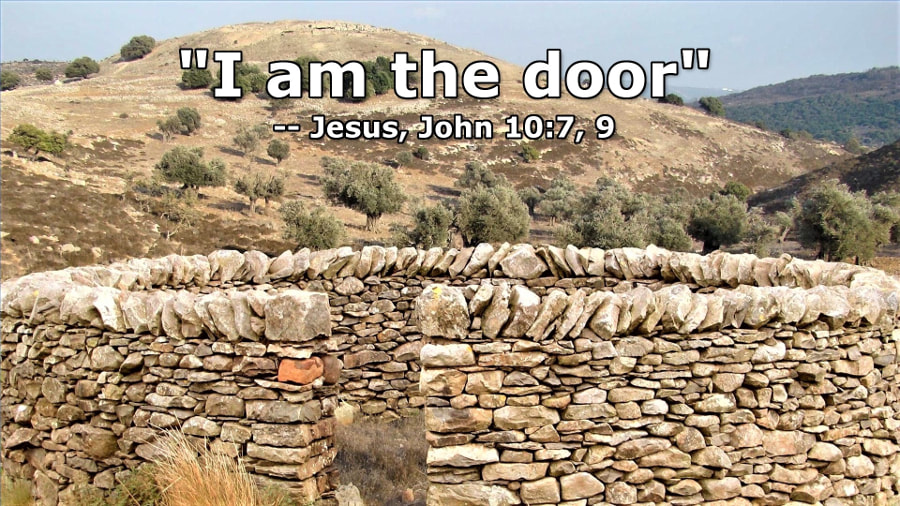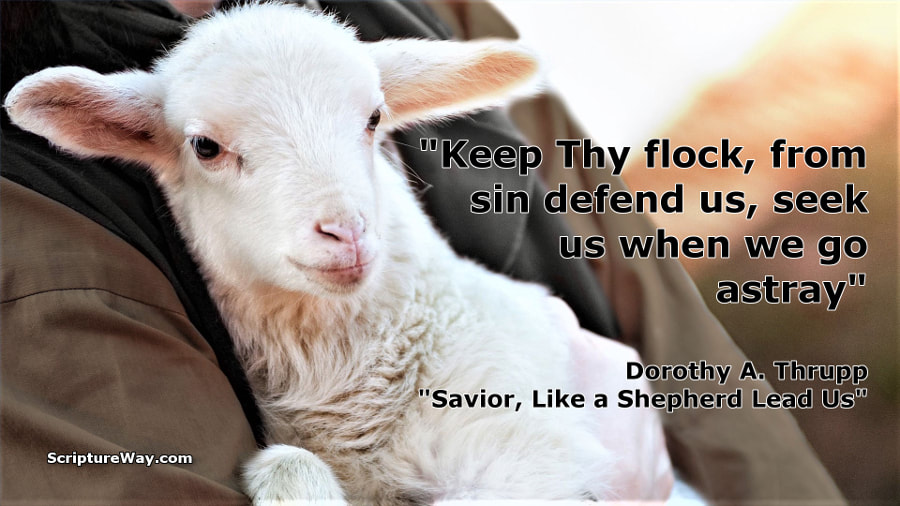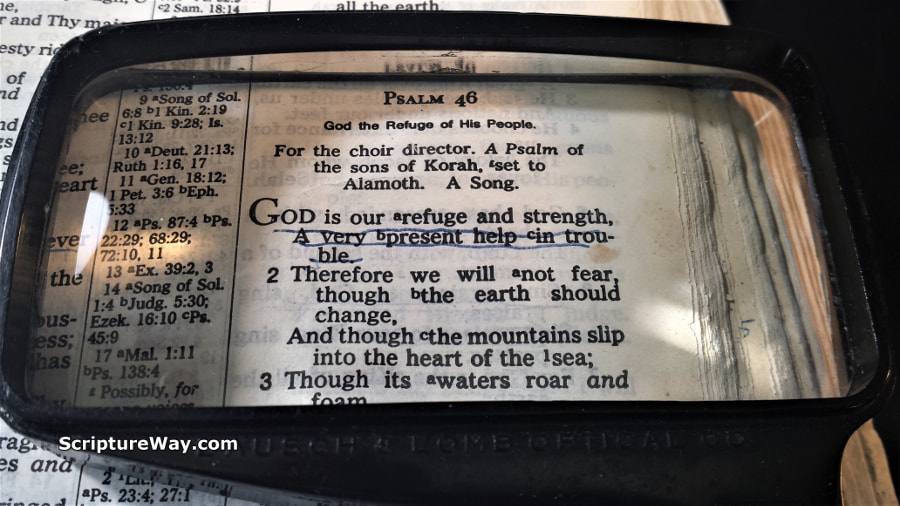"I have set the Lord always before me; because he is at my right hand, I shall not be shaken." (Psalm 16:8 ESV)
"David said about him: 'I saw the Lord always before me. Because he is at my right hand, I will not be shaken.'" (Acts 2:25 NIV)
This lesson examines the meaning of the three phrases in Psalm 16:8 -- "I have set the Lord always before me," "Because he is at my right hand," and "I shall not be shaken."
Consider. Do you feel that God is always near you?
When David said, "I have set the Lord always before me," what did he mean?
When David said "I have set the Lord always before me," he felt that he was always in the presence of God -- that God was present with him, always near him, and always before his face (Psalm 16:8, Ref. 1, Ref. 2, Ref.3). David felt God's presence continually -- night and day, in public professions and in private meditations (Ref. 1). God was with him alike in happiness and in trouble (Ref. 4).
The apostle Peter quoted Psalm 16:8 during his Pentecost sermon (Acts 2:14-36). The first sentence of Acts 2:25 states, "David said about him: 'I saw the Lord always before me.'" The Greek word for saw in Acts 2:25 means to keep before one's eyes, metaphorically, to be mindful of one always (Ref. 5 Thayer's Greek Lexicon). When we see the Lord always before us, he is our focus, and he is preeminent in our thoughts, words, and deeds -- always. When Peter quoted Psalm 16:8 in Acts 2:25, Peter was clear that "the Lord" he was referring to was Jesus of Nazareth who God raised from the dead (Acts 2:22-25). "Because He Is At My Right Hand" Meaning
"At the right hand" is a place of protection and defense. "For he [the Lord] stands at the right hand of the needy one, to save him from those who condemn his soul to death" (Psalm 109:31, brackets added). "The Lord is your keeper; the Lord is your shade on your right hand" (Psalm 121:5).
Think of the image of a warrior standing at your right side, who in the conflict of battle extends his shield over his comrade on the left hand (you) to guard him (you) from attack (Ref. 6). The Lord's shield is big enough to protect you. David wrote, "But you, O Lord, are a shield about me, my glory, and the lifter of my head" (Psalm 3:3). Throughout the Bible, "at the right hand" also means the place of honor (Psalm 110:1, Mark 16:19). "I Shall Not be Shaken" Meaning ("I Will Not be Shaken" Meaning)
David said, "Because he [the Lord] is at my right hand, I shall not be shaken" (Psalm 16:8 ESV, brackets added). The King James Version translates this last phrase of Psalm 16:8 as "I shall not be moved." The New American Standard Bible translates this phrase as "I will not be shaken" (Psalm 16:8 NASB).
The Hebrew word for shaken or moved in Psalm 16:8 is mot (phonetically pronounced as mote). Mot means to totter, shake, or slip (Ref. 7). In Acts 2:25 (Peter's quotation of Psalm 16:8), the Greek word for shaken is saleuó. Saleuó means to agitate, shake, disturb, or to cast down from one's (secure and happy) state (Ref. 8). David felt the Lord's presence with him continually. Because the Lord was at his right hand, the Lord was close, ready to protect and save. Therefore, David was not shaken or moved (Ref. 4). For David, because the Lord was at his right hand, nothing could cast him down from his trust and confidence in the Lord. Summary - the Main Principles in this Lesson
As believers in Christ:
1. We should set the Lord always before us -- before our eyes, always preeminent in our thoughts, words, and deeds. 2. The Lord is at our right hand always to protect us and defend us. His shield is big enough to protect us. 3. Because the Lord is at our right hand, we will not totter, slip, be disturbed, or become cast down. In the Lord we trust, and in him we are confident and secure.
Apply. Lord Jesus, show me ways that I can better know your presence with me today and every day. Thank you for being at my right hand to protect me and help me. Thank you that in you I am secure.
References
1. https://biblehub.com/commentaries/barnes/psalms/16.htm 2. https://biblehub.com/commentaries/barnes/acts/2.htm 3. https://biblehub.com/commentaries/cambridge/psalms/16.htm 4. https://biblehub.com/commentaries/pulpit/psalms/16.htm 5. https://biblehub.com/greek/4308.htm 6. https://biblehub.com/commentaries/ellicott/acts/2.htm 7. https://biblehub.com/hebrew/4131.htm 8. https://biblehub.com/greek/4531.htm
2 Comments
Photo source: FreeBibleImages.org "How think ye? If a man have an hundred sheep, and one of them be gone astray, doth he not leave ninety and nine, and go into the mountains, and seek that which is gone astray?" (Matthew 18:12 1599 Geneva Bible) This article describes the scripture allusions for verse 2 of the children's hymn, "Savior, Like a Shepherd Lead Us." In verse 2 the hymn teaches us that Jesus befriends us, guards our way, keeps watch over us, defends us from sin, and seeks us when we go astray. In the first article in this series, Ref. 1, we learned about the background for the hymn text author, Dorothy A. Thrupp, and the hymn tune composer, William B. Bradbury. We also discussed the Biblical truths in verse 1 - that Jesus is our great Shepherd who leads us, cares for us, feeds us, and protects us. Jesus has redeemed us ("bought us"), and we belong to him (Ref. 1). Consider. At what time or times in your life did Jesus seek you when you had gone astray? In what ways does Jesus guard you and defend you from sin? Verse 2 for "Savior, Like a Shepherd Lead Us" "We are Thine, Thou dost befriend us, be the Guardian of our way; Keep Thy flock, from sin defend us, seek us when we go astray. Blessed Jesus, blessed Jesus! Hear, O hear us when we pray. Blessed Jesus, blessed Jesus! Hear, O hear us when we pray." -- Dorothy A. Thrupp (1779-1847, Ref. 2) To see the lyric sheet for all four verses of "Savior, Like a Shepherd Lead Us" on one page, click here. The lyrics are provided by Timeless Truths (Ref. 3). The Bible verses cited below are linked to the BibleGateway.com website and are quoted from the English Standard Version (ESV) unless noted otherwise (Ref. 4). Scripture Allusions - Verse 2 "We are Thine, Thou dost befriend us, be the Guardian of our way" This first line in verse 2 declares that we belong to Jesus, that he befriends us, and then asks Jesus to guard our way. We are Thine. We now belong to Jesus because he has redeemed us. The Apostle Paul wrote to Titus about "our great God and Savior, Christ Jesus, who gave Himself for us to redeem us from every lawless deed, and to purify for Himself a people for His own possession, zealous for good deeds" (Titus 2:13-14 NASB). This phrase, "We are Thine," continues the theme of redemption that the author stated at the end of verse 1 (Ref. 1, Ref. 3). Thou dost befriend us. Not only has Jesus given his life in the past to show us that he is our friend (John 15:13), he also loves us and treats us with close personal affection now in the present (Ref. 5). Jesus told his disciples, and he tells us who believe in him and follow him now, "I have called you friends" (John 15:15). Because Jesus is our Friend and we are his friend we love him and we keep his commandments (John 14:15, John 15:14). Be the Guardian of our way. In this phrase, we ask Jesus to be our spiritual "guard rails" and keep us on the right path. Jesus said, "When the Spirit of truth comes, he will guide you into all the truth, for he will not speak on his own authority, but whatever he hears he will speak, and he will declare to you the things that are to come" (John 16:13, Ref. 6). "Keep Thy flock, from sin defend us, seek us when we go astray." The three phrases in this line continue the image of the good Shepherd and what he does to protect his flock, his sheep. All three phrases are in prayer-like language. Keep Thy flock. In the phrase, "keep Thy flock," we ask Jesus, our Shepherd, to guard and protect us with personal interest and vigilance (Ref. 7). We learn the meaning of "keep" from a famous verse about the birth of the Savior. "And in the same region there were shepherds out in the field, keeping watch over their flock by night" (Luke 2:8). The Greek word in Luke 2:8 for keeping means guarding, protecting, and exercising unbroken vigilance (Ref. 7). From sin defend us. Jesus defends us from sin through the word of God and the Holy Spirit whom he has sent to indwell those who believe in Christ. Jesus said, "But the Helper, the Holy Spirit, whom the Father will send in my name, he will teach you all things and bring to your remembrance all that I have said to you" (John 14:16). David described the importance of memorizing and remembering scripture so he could apply it to guard himself from sin (Psalm 119:9-11). Jesus remembered and quoted scripture to defend himself from the devil when the devil tempted him (Matthew 4:1-11). The Apostle Paul instructed believers about the importance of the word of God coupled with truth and faith to "extinguish all the flaming darts of the evil one" (Ephesians 6:13-17). Seek us when we go astray. When we go astray (off course), Jesus will come looking for us. Jesus said, "How think ye? If a man have an hundred sheep, and one of them be gone astray, doth he not leave ninety and nine, and go into the mountains, and seek that which is gone astray?" (Matthew 18:12 1599 Geneva Bible). The Greek word for astray (used twice in this verse) means "get off-course; to deviate from the correct path (circuit, course), roaming into error, wandering; (passive) be misled" (Ref. 8). Note the interesting parallel in Genesis when the Lord God came walking in the garden seeking Adam and Eve after they had sinned (Genesis 3:8-9). "Blessed Jesus, blessed Jesus! Hear, O hear us when we pray." (Phrase repeated) The hymn text reminds us to pray in child-like trust to our Savior who protects us, defends us, and seeks us when we go astray. The request to God, "Hear my prayer," is common in the Psalms. David prayed, "O God, hear my prayer; give ear to the words of my mouth" (Psalm 54:2). "Hear my prayer, O Lord; give ear to my pleas for mercy!" (Psalm 143:1). John the disciple of Jesus wrote to believers in Christ, "I write these things to you who believe in the name of the Son of God, that you may know that you have eternal life. And this is the confidence that we have toward him, that if we ask anything according to his will he hears us" (1 John 5:13-14, italics added). Listen and Sing Along Click on this YouTube link - Solo piano meditation on the hymn "Savior, like a Shepherd Lead Us" with sing-along lyrics. Recorded by Rick Betts - March, 2011. Prayer Thank you, Jesus, for seeking us and finding us when we have gone astray. Thank you, Good Shepherd, for leading us and guarding us in the way that leads to eternal life (John 10:27-28). References
1. http://www.scriptureway.com/home/savior-like-a-shepherd-lead-us-scripture-allusions-verse-1 2. https://en.wikipedia.org/wiki/Dorothy_Ann_Thrupp 3. https://library.timelesstruths.org/music /Savior_Like_a_Shepherd_Lead_Us/ 4. https://www.biblegateway.com/ 5. https://biblehub.com/greek/5384.htm 6. http://www.scriptureway.com/home/the-spirit-of-truth 7. https://biblehub.com/greek/5442.htm 8. https://biblehub.com/greek/4105.htm
Consider. Do you need God's help and strength for what you are facing today? How can you better experience God's protection as your refuge?
God is Our Refuge
The Bible tells us that God is our place of safety and protection from danger and distress. A refuge is a place where we go, and while we are inside, we are protected because our refuge surrounds us as our defense. David writes, "For You have been a refuge for me, A tower of strength against the enemy" (Psalm 61:3). Solomon writes, "The name of the Lord is a strong tower; The righteous runs into it and is safe" (Proverbs 18:10). David tells us from his own experience, "The angel of the Lord encamps around those who fear him, and delivers them" (Psalm 34:7, italics added).
The Bible provides several clear images for God as our refuge - a tower that we run into (Psalm 61:3, Proverbs 18:10), our shelter from the storm (Isaiah 25:4), our rock and fortress (Psalm 18:2), our shield (Psalm 28:7), and our hiding place (Psalm 32:7).
God is Our Strength
Note that Psalm 46:1 does not just say "God is strong" (which he is). This scripture verse says that God is our strength. We who are God's people can receive, experience, and apply God's strength to face our enemies such as worry, fear, discouragement, and opposition. God gives us the strength to accomplish the work he gives us to do in the face of these enemies.
The Apostle Paul knew that God was his strength. Paul wrote during his imprisonment, "I can do all things through Christ who strengthens me" (Philippians 4:13). God provides strength to the believer to accomplish what God gives the believer faith to do (1 John 5:4). As believers, we need God's strength when we encounter resistance and trials. God provides us that strength. Hymn composer Will L. Thompson (1847-1909) writes, "Jesus is all the world to me, My life, my joy, my all; He is my strength from day to day, Without him I would fall" (Ref. 1). David writes, "The Lord is my strength and my shield; in him my heart trusts, and I am helped; my heart exults, and with my song I give thanks to him" (Psalm 28:7). God is a Very Present (Proven) Help in Trouble
The word for help means aid, assistance (Ref. 2, Ref. 3). The word translated as present means proven to be (Ref. 4), that is, God is proven to be our help in trouble. The word very means exceedingly, emphasizing that this statement is true (Ref. 5, Ref. 6). Because God is proven to be our help in trouble, we have nothing to fear (Psalm 46:2).
David writes, "For you have been my help, and in the shadow of your wings I will sing for joy" (Psalm 63:7). The writer of Hebrews states, "The Lord is my helper; I will not fear; what can man do to me?" (Hebrews 13:6).
Summary. Let's review the main principles in this lesson.
1. God is our "go to" place for refuge, safety, and protection from danger. God surrounds us as our defense. 2. God is our source of strength to face our enemies and to do the work he gives us to do. 3. God is proven to be our help in trouble, and we have nothing to fear, repeat, we have nothing to fear.
Apply. Take time now to pray. Thank God for being your refuge - your protection, your place of safety. Ask God to give you strength and faith to face your enemies and to do the work that God has given you to do. Thank God that because of him you have nothing to fear.
Listen to/Watch Video. "A Mighty Fortress" sung by HeartSong - Cedarville University, Cedarville, Ohio, USA.
References
1. https://hymnary.org/text/jesus_is_all_the_world_to_me_my_life_my 2. https://biblehub.com/hebrew/5833.htm 3. https://www.merriam-webster.com/dictionary/help 4. https://biblehub.com/hebrew/4672.htm 5. https://biblehub.com/commentaries/barnes/psalms/46.htm 6. https://biblehub.com/hebrew/3966.htm
Photo source: FreeBibleImages.org

Permanent Sheepfold Enclosure - Holy Land. Photo Copyright David Padfield. Used under license. Permanent sheepfolds were built on the sunny side of valleys where there is protection from cold winds. These had stone walls, 4-5ft high and one entrance guarded by the shepherd. Thorns were often put on the top of walls to deter wild animals. Jesus referred to such a sheepfold and to thieves and robbers climbing over the wall (John 10:1-3).
"So Jesus said to them again, 'Truly, truly, I say to you, I am the door of the sheep.' " (John 10:7, Ref. 1)
"I am the door; if anyone enters through Me, he will be saved, and will go in and out and find pasture." (John 10:9)
"Christ is the Door. And what greater security has the church of God than that the Lord Jesus is between it and all its enemies? ... Here are plain directions how to come into the fold; we must come in by Jesus Christ as the Door." -- Matthew Henry (Ref. 2)
This lesson is the third in a series on the "I AM" statements of Christ. This lesson discusses Jesus' "I am the door" statements in John 10:7 and John 10:9.
Consider. Have you entered into the church of God by believing in the Lord Jesus Christ? Are you experiencing spiritual nourishment in Christ? "If anyone enters through Me" - John 10:9
We enter the sheepfold, the church of God, through Jesus Christ (and only through Jesus Christ). Jesus said, "Truly, truly, I say to you, I am the door of the sheep" (John 10:7). We enter that door when we place our faith and trust in Jesus Christ. "As the only proper way of entering the fold was by the door, so the only way of entering the church of God is by believing on him and obeying his commandments" (Ref. 3).
Jesus said, "I am the way, and the truth, and the life; no one comes to the Father but through Me" (John 14:6). "He will be saved"
Once we have entered the door by faith and trust in Jesus Christ, we are saved. Jesus delivers us from perils such as ravenous wolves and false shepherds (Ref. 4, John 10:1-2). Jesus frees us from the power, guilt, and penalty of sin (Romans 8:1-2, Ephesians 2:1-9). Jesus gives us eternal security. Jesus said, "My sheep hear My voice, and I know them, and they follow Me; and I give eternal life to them, and they will never perish; and no one will snatch them out of My hand" (John 10:27-28).
HELPS Word-Studies defines saved as rescued from destruction and brought into divine safety (Ref. 5). "And will go in and out and find pasture"
To go "in and out" is the common Old Testament expression to denote free activity of daily life (Ref. 6). When Moses charged the Israelites at Mount Gerizim to obey the Lord, he said, "Blessed shall you be when you come in, and blessed shall you be when you go out" (Deuteronomy 28:6, Deuteronomy 27:11-12, Deuteronomy 28:1-2). David wrote about the Lord, the Keeper of Israel (Psalm 121:5). David said, "The Lord will guard your going out and your coming in from this time forth and forever" (Psalm 121:8).
Through Jesus (because he is the door), we have security for our daily needs and nourishment for our souls. Under the care of Jesus, we find pasture - food for our souls (Ref. 7). David wrote, "The Lord is my shepherd; I shall not want. He maketh me to lie down in green pastures: he leadeth me beside the still waters" (Psalm 23:1-2 KJV).
Apply. Have you entered the sheepfold of Christ by believing in him? If not, then put your faith and trust in him today. Are you spending time with Jesus daily to receive spiritual nourishment? How can you improve in this area?
References
1. http://www.ScriptureWay.com/home/when-jesus-said-truly-truly-what-did-he-mean 2. https://biblehub.com/commentaries/mhc/john/10.htm 3. https://biblehub.com/commentaries/barnes/john/10.htm 4. https://biblehub.com/commentaries/pulpit/john/10.htm 5. https://biblehub.com/greek/4982.htm 6. https://biblehub.com/commentaries/egt/john/10.htm 7. https://biblehub.com/commentaries/benson/john/10.htm |
Daily Bible Verse(Click the link above) AuthorMr. Whitney V. Myers. Christian. For more information, please visit the Author Page. Posting ScheduleI plan to provide new postings about once a month. Planned Topics(subject to change) Recent Posts(most recent three months) Popular Posts(top 10) Categories
All
Archives
July 2024
|
|
Copyright 2018-2024 Whitney V. Myers |
Listed in Feedspot's Top 100 Bible Study Blogs and Websites |



 RSS Feed
RSS Feed
